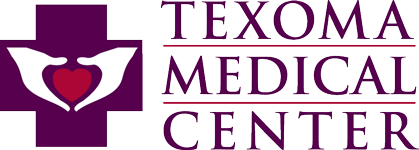Recovering with the Help of an Amazing Support System
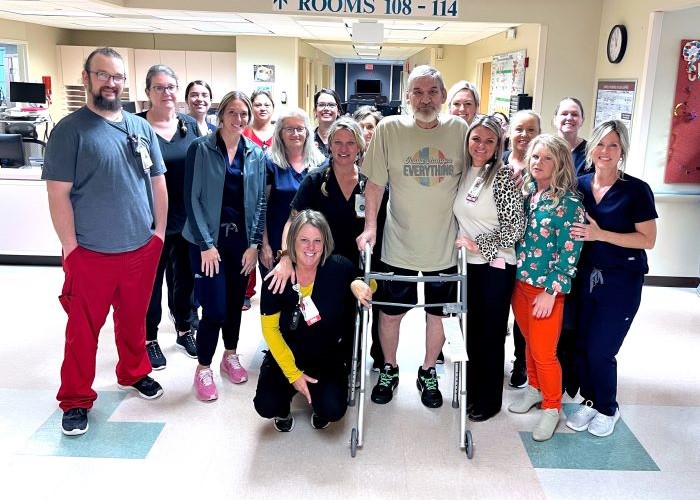 October 30, 2023
October 30, 2023
On April 18, 73-year-old Gordon Bruce was arriving at his granddaughter’s softball game when he suddenly passed out. He was rushed to the emergency department at Texoma Medical Center, where it was determined he had elevated troponins and would need two stents placed in his heart. The procedure took place the next day in the hospital’s nationally accredited catheterization lab.
During the stent procedure, Bruce’s care providers discovered his condition was more severe than initially realized, and they immediately scheduled him for transcatheter aortic valve replacement (TAVR) on May 18. Matters took a turn for the worse when his heart stopped, what’s known as cardiopulmonary arrest, while he was on the operating table for the TAVR procedure.
To save his life, his care providers put him on extracorporeal membrane oxygenation (ECMO), a form of treatment that uses a pump to circulate blood through an artificial lung. It takes over the workload of the heart or lungs allowing the injured organs to rest and heal.
On ECMO Before Open Heart Surgery
With Bruce unconscious, it was difficult for his care 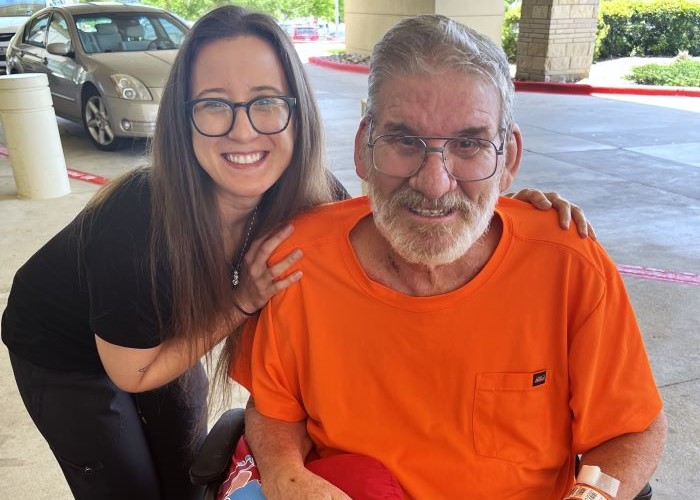 providers to diagnose the cause of his crash during the TAVR procedure. “We didn’t know why he coded, which made ECMO a good treatment option,” said Megan Rosenfield, RN, who is the ECMO coordinator at TMC. “It allowed him time to rest and recover until he was strong enough for open heart surgery.”
providers to diagnose the cause of his crash during the TAVR procedure. “We didn’t know why he coded, which made ECMO a good treatment option,” said Megan Rosenfield, RN, who is the ECMO coordinator at TMC. “It allowed him time to rest and recover until he was strong enough for open heart surgery.”
During Bruce’s time in the ECMO program, a multidisciplinary group of nurses, ECMO specialists, respiratory therapists, cardiologists and other critical care specialists collaborated to make sure he received all the care he needed. Once they determined he had regained enough strength, his open-heart procedure took place successfully on May 22.
Off ECMO, But Still a Long Way to Go
When Bruce woke up o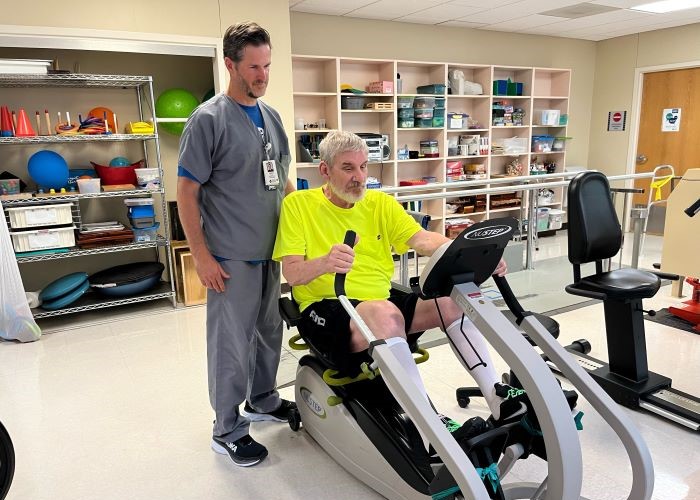 n June 1 with his wife at his bedside, he was shocked to learn from her that he had received open heart surgery. “I almost didn’t believe it at first”, he recalls. “I looked under my shirt and saw the scar and thought, ‘Well, I’ll be.’ ” He was very grateful when they took the tube out of his throat, and for all the care he received. Bruce’s recovery meant a lot to everyone in the ECMO program. “We see a lot of very sick patients and some very tough outcomes,” Rosenfield says. “Seeing him recover the way he did was very uplifting for all of us.”
n June 1 with his wife at his bedside, he was shocked to learn from her that he had received open heart surgery. “I almost didn’t believe it at first”, he recalls. “I looked under my shirt and saw the scar and thought, ‘Well, I’ll be.’ ” He was very grateful when they took the tube out of his throat, and for all the care he received. Bruce’s recovery meant a lot to everyone in the ECMO program. “We see a lot of very sick patients and some very tough outcomes,” Rosenfield says. “Seeing him recover the way he did was very uplifting for all of us.”
Although he was now conscious, Bruce was struggling to speak, and his care providers realized that he had also suffered a stroke during his time on ECMO. This new development, in addition to his weakened state from the procedure, meant he would need to participate in physical, occupational and speech therapy at the TMC’s Reba McEntire® Center for Rehabilitation.
Rehabilitation with Help from His Daughter
Fortunately for Bruce, his dau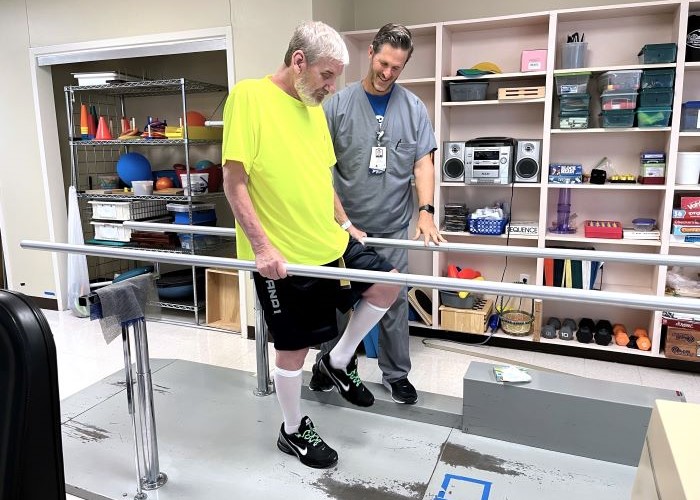 ghter Laura Malone happens to be one of TMC’s nurse coordinators, whose job involves helping patients transition from surgery to rehabilitation. She wasted no time getting everything set up for his transfer to Reba Rehab once he was strong enough to leave the hospital. “My dad is very independent and rarely sick,” Malone says. “It was very hard to see him like that.”
ghter Laura Malone happens to be one of TMC’s nurse coordinators, whose job involves helping patients transition from surgery to rehabilitation. She wasted no time getting everything set up for his transfer to Reba Rehab once he was strong enough to leave the hospital. “My dad is very independent and rarely sick,” Malone says. “It was very hard to see him like that.”
Although his time in rehabilitation was difficult, Bruce’s recovery journey was made easier by having his daughter there to support him. “We ate breakfast together every day while I was in there and she set me straight when I got stubborn,” he recalls fondly. “I wanted to leave before I was ready, and she would say, ‘Pop, you’re not going anywhere until you get better.’ ”
“He did great over here,” Malone says of the experience. “It was good to see him every day and help keep his spirit up. His church friends also visited, and that helped a lot, too.”
Moving Forward with Gratitude
Bruce spent a month at Reb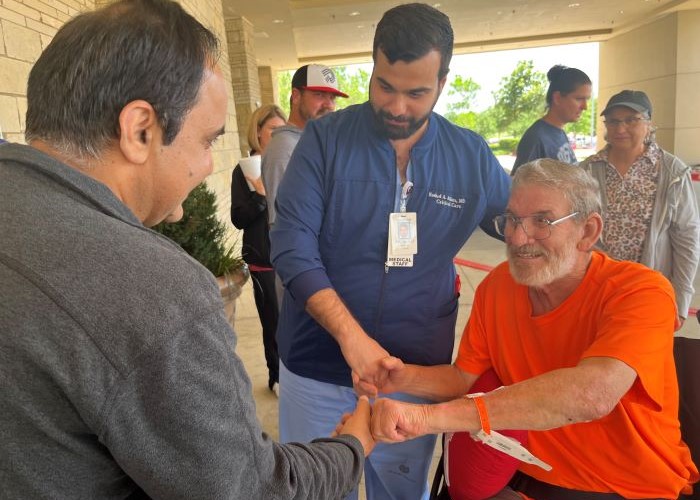 a Rehab before going home on July 11. He now participates in physical, occupational and speech therapy on an outpatient basis, where he continues to make great strides in recovery. He also reads his Bible out loud every day to improve his speech.
a Rehab before going home on July 11. He now participates in physical, occupational and speech therapy on an outpatient basis, where he continues to make great strides in recovery. He also reads his Bible out loud every day to improve his speech.
Looking back on everything that happened, Bruce says, “The doctors and nurses did an incredible job, and the Lord was behind them the whole way. It was absolutely a miracle that they brought me through it.”
